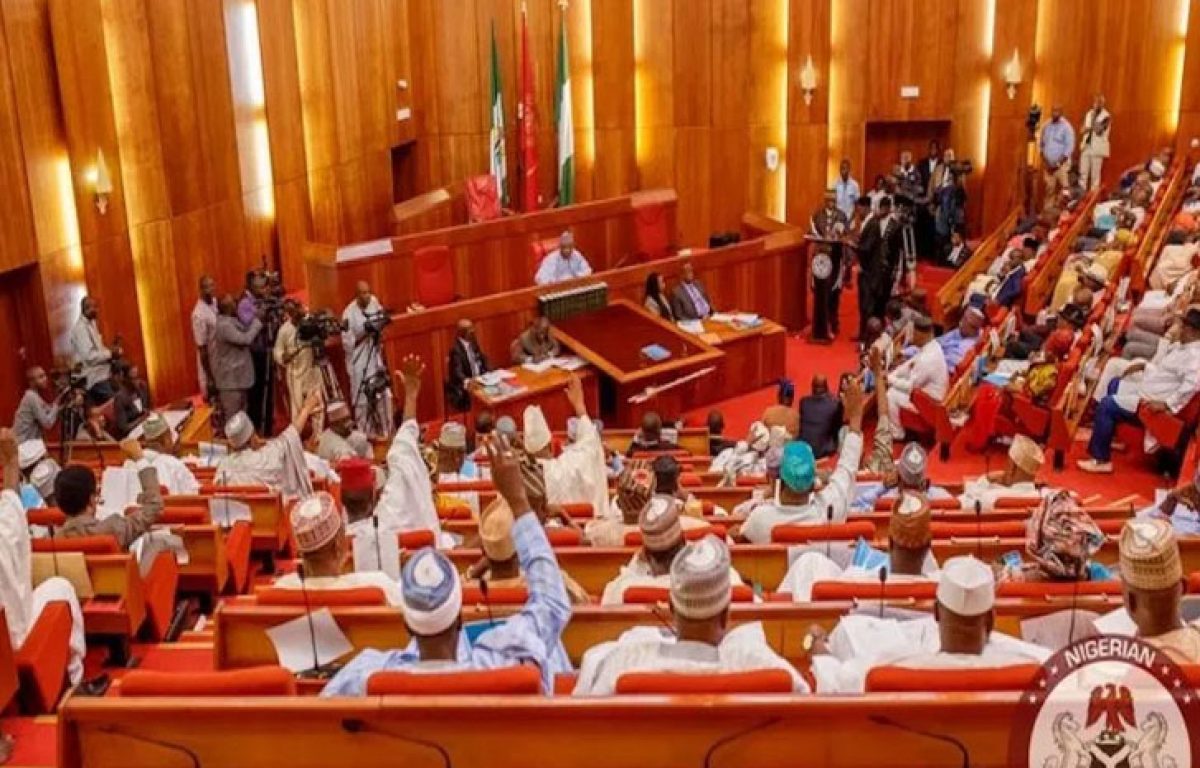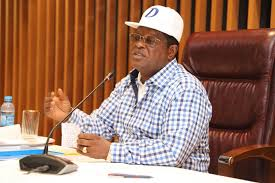Business
Nigeria Priced Its $500M Notes At 7.5% Yield

By Joseph INOKOTONG
The Federal government Wednesday, announced that it priced its offering of US$500 million aggregate principal amount of notes (the “Notes”) at a yield of 7.5% under its US$1.5 billion (increased from US$1 billion) Global Medium Term Note Programme, which will be consolidated and form a single series with the Republic’s existing US$1,000,000,000 7.875 per cent. Notes due 2032 issued on 16 February 2017 (the “Original Notes”). The terms and conditions of the Notes will be identical to those of the Original Notes, paying a coupon of 7.875% per annum, maturing on 16 February 2032 and repayable by way of bullet repayment of the principal together with the Original Notes. As with the Original Notes, the Republic intends to use the proceeds of the Notes to fund capital expenditures in the 2016 budget.
A statement signed by Salisu Na’Inna Dambatta
Director (Information)
“the successful pricing, which is priced 37.5bps inside the original coupon rate, demonstrates continued strong market appetite for Nigerian securities. This, despite continued volatility in emerging and frontier markets and shows confidence by the international investment community in Nigeria’s economic reform agenda.”
When issued, the Notes will be admitted alongside the Original Notes to the official list of the UK Listing Authority and to trading on the London Stock Exchange’s regulated market. The Republic may apply for the Notes to be eligible for trading or listed on the Nigerian Stock Exchange and Financial Markets Dealers Quotations Over-the-Counter Securities Exchange.
Pricing of the Notes comes shortly after Nigeria launched its National Economic Recovery and Growth Plan 2017-2020 on 7 March 2017.
The plan focuses on policy objectives in five core areas; macroeconomic policy, economic diversification and growth drivers, competitiveness, social inclusion and jobs, and governance and other enablers. Key targets of the NERGP include reaching single-digit inflation, further growth in the agricultural sector, reducing unemployment, increasing operational energy capacity and domestic refining capacity, improving transportation infrastructure and stabilising the exchange rate, with an emphasis on implementation, monitoring and evaluation of these economic goals.
Commenting following the successful pricing, the Honorable Minister of Finance Mrs Kemi Adeosun said:
“The proceeds from this additional note issuance will go towards funding capital projects in the 2016 budget. Infrastructure spending is at the heart of our National Economic Recovery and Growth Plan, which was released earlier this month and guides how we will deliver the urgent reform our economy needs between now and 2020. Resetting the Nigerian economy is essential in order for us to deliver sustainable long term growth.”
Commenting on the Notes’ pricing, the DMO Director General, Dr Abraham Nwankwo said:
“Following the success of our US$1 billion note issuance in February, Nigeria is delighted to have increased our 2017 Eurobond programme to US$1.5 billion and to have secured the additional US$500 million. Nigeria was keen to take advantage of favorable market conditions and investor appetite for Nigerian debt to complete our foreign borrowing programme for the 2016 budget and deliver further funds for vital capital projects.”
Citi, and Standard Chartered acted as Joint Lead Managers and Stanbic IBTC, as Financial Advisers on this Issue.
The information contained in this communication shall not constitute an offer to sell or the solicitation of an offer to buy, nor shall there be any sale of the securities referred to herein in any jurisdiction in which such offer, solicitation or sale would be unlawful prior to registration, exemption from registration or qualification under the securities laws of any such jurisdiction. The Republic has not registered, and does not intend to register, any portion of the securities in any of these jurisdictions.
This communication is not an offer of securities for sale in the United States. The securities referred to herein have not been registered under the U.S. Securities Act of 1933, as amended (the “Securities Act”) and may not be offered or sold in the United States absent registration or an exemption from registration under the Securities Act, and the rules and regulations thereunder. The Republic does not intend to register any of the securities in the United States or to conduct a public offering of the securities in the United States or elsewhere.
This communication does not constitute an offer of the Securities to the public in the United Kingdom. This communication is being distributed to and is directed only at (i) persons who are outside the United Kingdom or (ii) persons who are investment professionals within the meaning of Article 19(5) of the Financial Services and Markets Act 2000 (Financial Promotion) Order 2005 (the “Order”), and (iii) high net worth entities, and other persons to whom it may lawfully be communicated, falling within Article 49(2)(a) to (d) of the Order, and (iv) any other persons to whom it may otherwise lawfully be communicated or caused to be communicated (all such persons in (i) to (iv) together being referred to as “Relevant Persons”). Any investment activity to which this communication relates will only be available to and will only be engaged with, Relevant Persons. Any person who is not a Relevant Person should not act or rely on this document or any of its contents.
The approval of the Nigerian Securities and Exchange Commission is not required for primary offerings of securities issued by the Republic. Any securities referred to herein have not been registered with the Nigerian Securities and Exchange Commission. Where securities issued by the Republic are listed on any securities exchange in Nigeria, the securities shall be subject to the relevant regulatory requirements relating to secondary market transactions of securities issued by the Republic. In such circumstances, offering participants will be required to comply with applicable rules and regulations in Nigeria in order to offer the relevant securities to the public in Nigeria.
Business
Senate Committee Commends Tinubu on Launch of National Halal Economy Strategy to Tap $7.7trn Global Market*

The Senate Committee on Finance has commended President Bola Ahmed Tinubu for launching Nigeria’s National Halal Economy Strategy, describing it as a bold and strategic move to position the country within the lucrative global halal market, estimated at $7.7 trillion.
In a statement signed by its Chairman, the committee praised the initiative as timely and aligned with international best practices. Several countries—including the United Kingdom, Canada, Australia, Malaysia, Indonesia, Saudi Arabia, the United Arab Emirates, Turkey, Brazil, Thailand, and Singapore—have successfully used halal frameworks to boost manufacturing, agricultural exports, financial markets, and foreign investment.
The committee highlighted Nigeria’s strong advantages for success in this space, including its vast agricultural resources, large domestic market, youthful population, growing manufacturing sector, and expanding services industry.
It noted that the strategy fits seamlessly into the Tinubu administration’s broader economic reforms, such as boosting non-oil revenue, diversifying exports, creating jobs, supporting small and medium enterprises (SMEs), and increasing foreign exchange earnings.
President Tinubu, represented by Vice President Kashim Shettima, officially unveiled the strategy on Thursday, February 6, 2026, at the Presidential Villa in Abuja.
The framework, developed in collaboration with Saudi Arabia’s Halal Products Development Company (HPDC) following a bilateral agreement signed in February 2025 at the Makkah Halal Forum, aims to enhance quality standards, certification processes, and competitiveness across sectors like food, pharmaceuticals, cosmetics, tourism, and ethical finance.
The committee described the strategy as inclusive, market-driven, and globally oriented, while fully respecting Nigeria’s diverse and pluralistic society.
It is projected to contribute significantly to the economy, with estimates suggesting it could add around $1.5 billion to Nigeria’s GDP by 2027 and unlock billions more in domestic value over the coming decade through expanded exports and investment.
The Senate Committee on Finance pledged its full legislative support, oversight, and cooperation to ensure smooth implementation, regulatory clarity, and long-term fiscal sustainability in the national interest.
“This decisive step reinforces Nigeria’s readiness to adopt proven international models, unlock new economic frontiers, and establish itself as a competitive player in the evolving global economy,” the statement concluded.
Business
Ex-Naval Chief Named in ₦100m Property Transaction Dispute
A property transaction dispute has emerged involving Zoe New Dawn Nigeria Limited and a former Chief of Naval Staff, following claims by the company’s chairman, Engr. Dr. Stephen Achema Akpa, that a ₦100 million payment made for land was not followed by a transfer of ownership.

According to Akpa, the payment was made in connection with a land transaction reportedly facilitated by the former naval chief. He alleged that despite documented payments, the land in question was neither transferred to the company nor was the money refunded.
Akpa said Zoe New Dawn Nigeria Limited possesses transaction records and related documents which, he claims, support its position in the dispute. He added that the company has initiated steps to seek redress through appropriate legal channels.
The matter has drawn attention due to the profile of the parties involved, particularly against the backdrop of recurring disputes linked to land ownership and property transactions in Nigeria’s real estate sector.
Industry observers note that unresolved land transactions remain a common source of litigation, often arising from disagreements over title documentation, intermediaries, and contractual obligations.
Zoe New Dawn Nigeria Limited stated that it intends to pursue the matter through lawful means to determine liability and recover any funds deemed outstanding.
As of press time, no official response had been issued by the former Chief of Naval Staff regarding the allegations. The dispute has not yet been confirmed as the subject of any court proceedings.
Business
Umahi Inspects Lekki Corridor’s 7th Axial Road Project, Expresses Confidence in CHEC

Minister of Works Senator Dave Umahi over the weekend inspected the progress of the 7th Axial Road project in the Lekki Corridor of Lagos.
The project, located behind the Dangote Refinery, is a crucial cargo handling route for the Lekki Deepwater Port and connects the Lekki Corridor with the Sagamu route.
The Minister expressed confidence in China Harbour Engineering Company Limited (CHEC), the project’s contractor, citing its successful delivery of the Lekki Deepwater Port and high-quality progress on the Makurdi-Enugu road reconstruction and expansion project. Umahi instructed that the roadbed filling work for Project LOT1 be completed by the end of April and directed the project team to accelerate resource input and tangible works to meet the deadline.
The 7th Axial Highway is expected to synergize with key infrastructure projects like the Coastal Road, Dangote Road, and Lekki Port, creating a comprehensive transportation hub model and boosting Nigeria’s port economy and industrial corridor. Umahi emphasized the need for environmental protection agencies to ensure efficient construction and steady progress while maintaining ecological safety.
A representative of CHEC who spoke during the inspection stated that the company would maintain a high level of resource input, implement the Minister’s directives, and coordinate safety, quality, and environmental protection to ensure the project’s timely and high-quality completion in other to unluck its port relief and regional economic benefits.
-

 Uncategorized5 years ago
Uncategorized5 years agoFG, states urged to harness flooding for ranching, others with technology – Agbaje
-

 Headlines10 years ago
Headlines10 years agoBreaking: EFCC seals Borno House of Assembly, as Hon members take to their heels
-

 News12 years ago
News12 years agoNigeria Security Operatives Stage Manhunt For Homosexual Perpetrator
-

 News9 years ago
News9 years agoHow 21-year-old Girl fled community over accusation of lesbianism
-

 News10 years ago
News10 years agoYobe Gov Moves Against Deputy
-

 Opinion7 years ago
Opinion7 years ago7 signs she has friend zoned you
-
Technology4 years ago
Online job placement company headhunts women
-

 Headlines10 years ago
Headlines10 years agoBorno Dep Gov Abducts Another Church Leader





